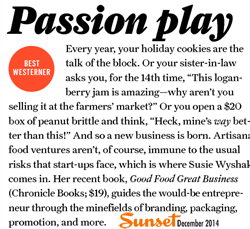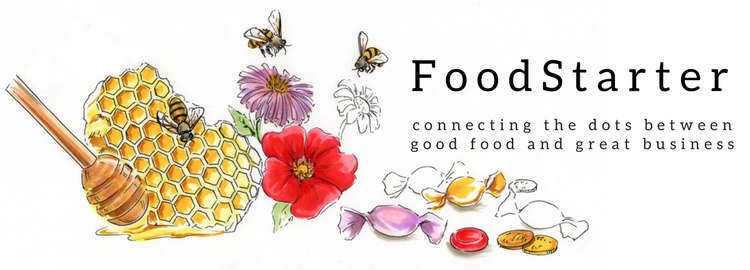I discovered Palo Alto Firefighters Hot Sauce at a market, by the cash register, and bought it on a whim to support the effort (visions of fire fighters dancing in my head). Months went by before I popped it open only to discover it’s one of those perfectly heat-flavor-balanced sauces you want to put on everything. I contacted creator Lee Taylor whose sauce recently won a First Place Scovie Award, to hear how he got started with this company whose profits go 100% to fund scholarships for local kids:
 It all started when Lee Taylor was going through what his wife, Karen, called a mid-life crisis, at around 40 years old. “I was feeling very grateful for my life. My kids were blossoming.” He wanted to pay it forward. While fighting fires during the past 30 years, Lee had seen lots of people from the Palo Alto, California community who were nowhere close to the millionaires we often hear about. He decided to help locals who needed financial help to start school. (Shouldn’t everyone’s mid-life crisis be so positive?)
It all started when Lee Taylor was going through what his wife, Karen, called a mid-life crisis, at around 40 years old. “I was feeling very grateful for my life. My kids were blossoming.” He wanted to pay it forward. While fighting fires during the past 30 years, Lee had seen lots of people from the Palo Alto, California community who were nowhere close to the millionaires we often hear about. He decided to help locals who needed financial help to start school. (Shouldn’t everyone’s mid-life crisis be so positive?)
The scholarship granting began with a series of long distance bike ride fundraisers. While training for the third ride, Lee got hit by cars 3 times. His wife, Karen, suggested he might re-think the biking. It did not take much to convince him. Lee told this story around the firehouse kitchen. “And after everyone was done laughing, a couple of friends said ‘’Why don’t you sell that sauce you’ve been making for 10 years? You can do it year round (unlike biking). And it won’t be dangerous.'” They connected the dots, and the plan shifted into high gear: Some of his co-workers happened to have contacts in food. They offered to get the project started if Lee promised to take it over. The goal would be for a new non-profit, the Palo Alto Firefighters Charitable Fund, to give scholarships away. The catch: Lee could not take any money for himself from the non-profit. He has made good on this promise.
Transitioning to a Hot Sauce Co-packer
Lee quickly learned that the peppers grown in his personal garden — the original impetus for the hot sauce — could not be used legally, due to food safety laws. So his co-packer in Healdsburg started sourcing peppers from a Northern California farm. As usual, the production level recipe needed plenty of testing. “We didn’t get the formula right in the first time, in the large production,” Lee explains. “We had to try many times over a month if not more, and did tastings with family. Once we couldn’t tell the difference from the original, it was close enough.” The only thing they had to add was a tiny bit of seaweed-based xanthan gum to prevent the pulpy vegetable matter from settling from the liquid.
In December 2005, the first batch sold out right away (delivered from the trunk of Lee’s Car). “People would call and get ahold of firemen I worked with. This worked for a year or two. People would write letters with a check, saying what they wanted.” He’d go to the post office to mail it. “We did 35 orders that first year. The next year when they set up PayPal they did 70; the next year 150; and this year 1,500. We get 3-7 orders a day.”
Whole Foods’ discovery (and obsession with) Palo Alto Firefighters Hot Sauce has had a huge impact on sales. “The summer of 2012, we got into 6 Whole Foods. Then in May 2013, regional headquarters contacted him raving about sales numbers: “You need to be in all of our Northern California stores. Get in a distributor and try to work out a deal.” He did, and the sauce was soon in 38 Whole Foods…and counting. Part of the appeal, beyond the yummy factor and charitable effort, is the product’s salt-free recipe. Whole Foods now uses the sauce at various events and around the office.
How the Charitable Giving Works
The organizational learning experiences came fast, with an “FYI” from the IRS. “When you start a 501c3 you’re on probation for 5 years with the IRS,” Lee explains. “You have to file returns or they cancel your 501c3.” After the non-profit reported sales from the sauce, Lee discovered the IRS prevents a non-profit from generating more than 10 percent directly from sales of products and services. “They do this to protect legitimate businesses from disguising businesses as non-profits,” says Lee. “Non-profits can take donations and raffle off items.” So they created an LLC that would sell the sauce and make donations to the 501c3 non-profit.
The non-profit defines very specific rules to clearly specify whom the grants are for: Palo Alto natives who are current residents, who are graduating from an accredited high school in the city. These specifics help avoid unnecessary processing of applicants who don’t really fit with the non-profits’ goals.
The LLC pays for production, labor expenses, co-packer, labels, etc. “We operate as a business and the profits ALL go to the charity.” With no salaries, the non-profit operate on a .5% expense, spending about $200-300 a year for office supplies and equipment. This low expense ratio is almost unheard of!
The Next Small Giant ?
Lee finds himself in the same boat as companies like Red Boat Fish Sauce, whose strength is its core product with additional products in small variations. Most such companies get the pressure to expand. Says Lee, “I’ve been told I need a line of 3-7 products so for people who love my hot sauce they’ll buy the other products. If they like one thing it will lead them to buy another thing.” Lee did make a hotter version of the original, upon request from heat freaks. “Those are the 2 products I can genuinely and sincerely say they started in the back of the firehouse. I’m not sure I could get behind other products [like rub and mustard]. I’m not sure I need to be big and that I want to compromise the genuineness of it.”
What the company is doing is sure to spread the brand even farther: .25 ounce single-serve hot sauce pouches, sold in cartons of 500, which can serve as a tasting business card.
The Family Business and Scholarship Legacy
Lee retired a year ago from the fire department, where he was (and still is) the youngest person to ever be hired there at 20. To date the non-profit has given 92 scholarships away. Says Lee, “I could not be prouder that we have given these scholarships away. I’ve had a lot of assistance but the ball has been in my court over these 10 years.” He sends the check to the school that they’re going to so the students can pursue the field of their choice. “We had someone go to a beauty college and someone else go to Dartmouth…and everything in between.”
For the most part, Palo Alto Firefighters has been a one-man show although he and his kids send out packages as well as make a 250 mile loop around the Bay Area dropping off orders to retailers.
[one-half-first]
Now many years of fishing and golfing in his line of sight, Lee has reduced his hours to part-time. The kids now work part-time for the LLC — his daughter handling email and accounting, his son handling logistics. They get paid a part-time wage and are soaking in great learning experiences — much like the kids receiving the scholarships from their hard work.
[/one-half-first][one-half]
Take This Away…
- A great product sells itself!
- The LLC – Non-profit combination is necessary to fit with IRS laws.
- Planning goes a long way (as someone with a career in the “emergency” field, Lee is a huge fan of planning)
- Stick to your vision and your heart.
- Make your mid-life crisis your legacy.
[/one-half]






